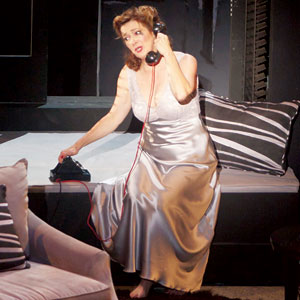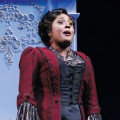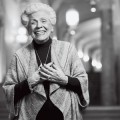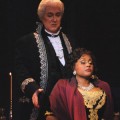During the 2003–04 season, its last at the Montgomery Theater, Opera San Jose staged Leoncavallo’s Pagliacci on a double bill with Mascagni’s frequently paired Cavalleria rusticana. But 15 seasons back, the company paired Poulenc’s La voix humaine with Pagliacci, the same program heard in a new production Sunday at the California Theatre.
The Poulenc opera demands that a soprano of exceptional acting skills deliver a solo performance for its entire, uninterrupted 50 minutes on the stage, supported only by the pit orchestra and its conductor. In actual fact, however, the unseen third party to the collaboration is its stage director. In this case, Layna Chianakas, who sang the role for Opera San Jose in 1996, returned to direct the two sopranos who are making this role theirs for the first time.
Heard Sunday, Suzan Hanson, who appeared in the 2008 production of Evgeny Onegin, portrayed the nameless woman, desperate at being abandoned by her lover, with smoldering intensity and wildly suicidal moods swings. Frantically drinking, smoking and struggling against interruptions to keep contact by telephone, she finds that every ploy comes to nothing.
The piece, written by Jean Cocteau, offers its performer a draining exercise in grief and anxiety, a formula for psychological disintegration. The woman relives their happy days, the tiny details of their lives together, her dreams at night, even her new-found paranoia over how the dog now looks at her. In a protracted recitative, the role also demands sustained vocal prowess, with no small range.
Harrowing to witness, Hanson’s tour-de-force performance won cheers from the rapt, largely first-time audience. Conductor Bryan Nies’ orchestra tracked his leadership sensitively and Poulenc’s score with rich sonority, though at times masked Hanson’s more nuanced moments. (Someone who had also attended the opening-night performance by Betany Coffland—the role is double-cast—remarked to me that Coffland was “more theatrical, more hysterical.”) The lighting and French-inflected set design—architectural details hand-sketched in white lines against black and dark gray—deserve special notice. One question came up during the interval: Why not perform the work in an English translation? Learning it in French would only seem to make sense for audiences in Montreal or France itself.
Against a plain set, Cynthia Stokes’ stage direction for Pagliacci also triumphed, acutely attentive to tiny details and skillfully lit. Leoncavallo’s flawless melodrama unfolded with inexorable drive, from the opening prologue to the bloody “La commedia è finita.” (As the tension mounted, the kids in the “audience” were spirited away by their anxious parents, smartly intensifying the terror.)
One could imagine bigger voices, but hardly better casting across the board. Alexander Boyer’s Canio (Pagliaccio) projected menace and vulnerability in equal measures. Jouvanca Jean-Baptiste’s Nedda was simultaneously enchanting and fiercely combative. Of the three baritones, Jason Detwiler’s prologue rang with clarion authoritativeness before he turned into the vengeful Tonio. Michael Dailey, as Beppe, tried in vain to keep peace, and charmed as Arlecchino. Krassen Karagiozov played Nedda’s impassioned if ultimately sacrificed lover, Silvio. But for want of a quieter orchestra to balance those moments on stage, conductor Nies and his musicians kept the opera’s hot blood flowing.
Opera San Jose’s Pagliacci and La voix humaine
Runs through Nov. 27
California Theatre, San Jose
Get Tickets and More Info on Opera San Jose’s Pagliacci and La voix humaine

 Best Bites: San Jose’s Best Date Restaurants
Best Bites: San Jose’s Best Date Restaurants  Review: Jin Sho
Review: Jin Sho 


